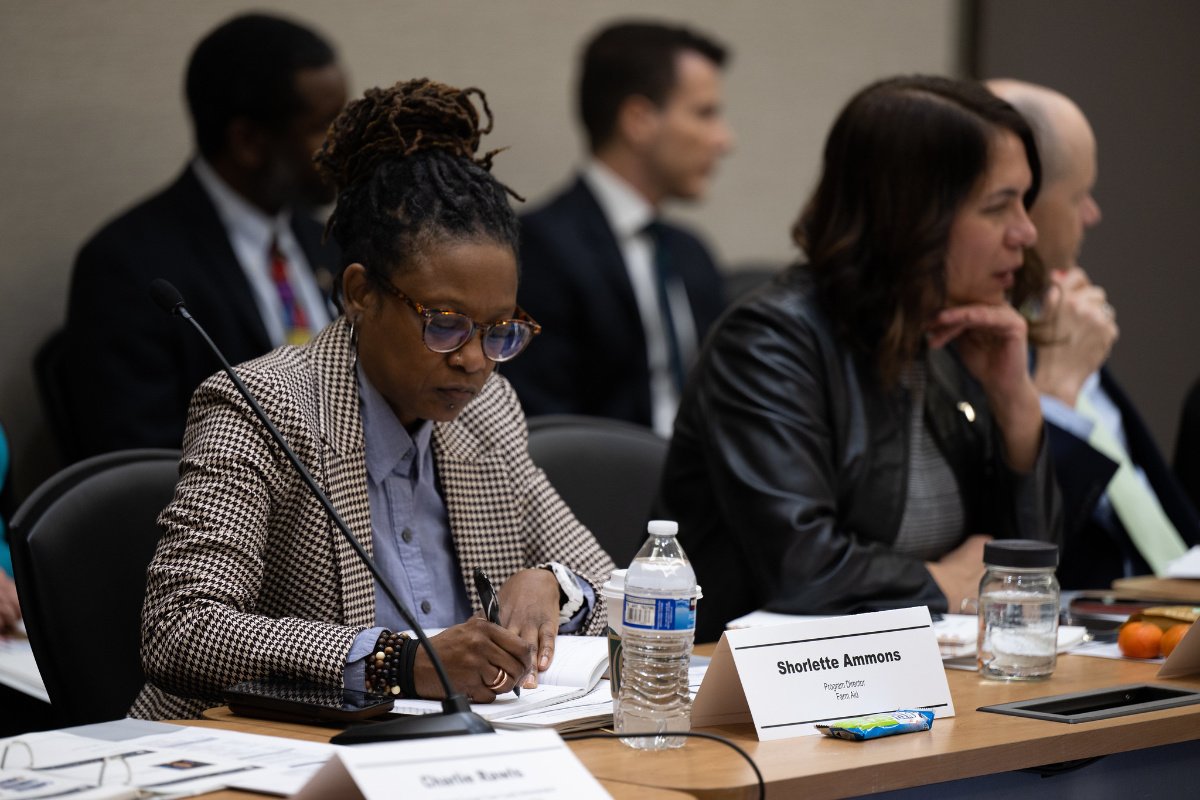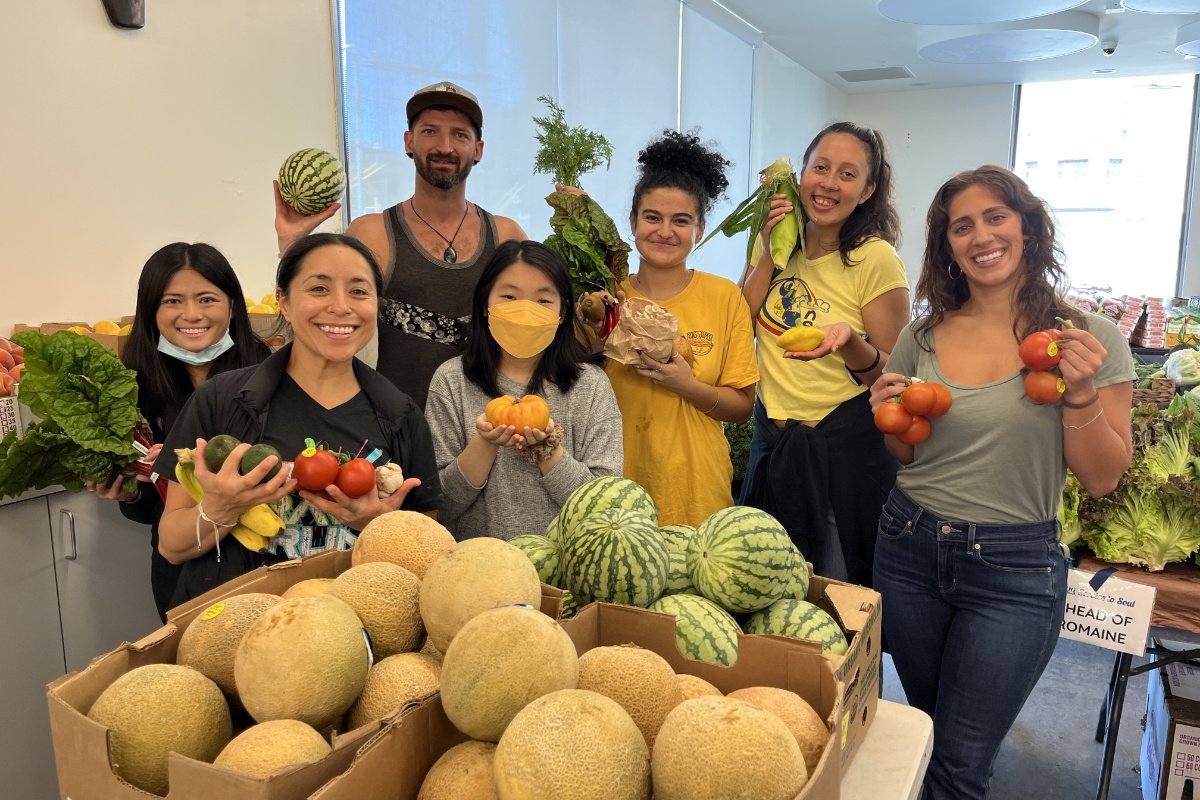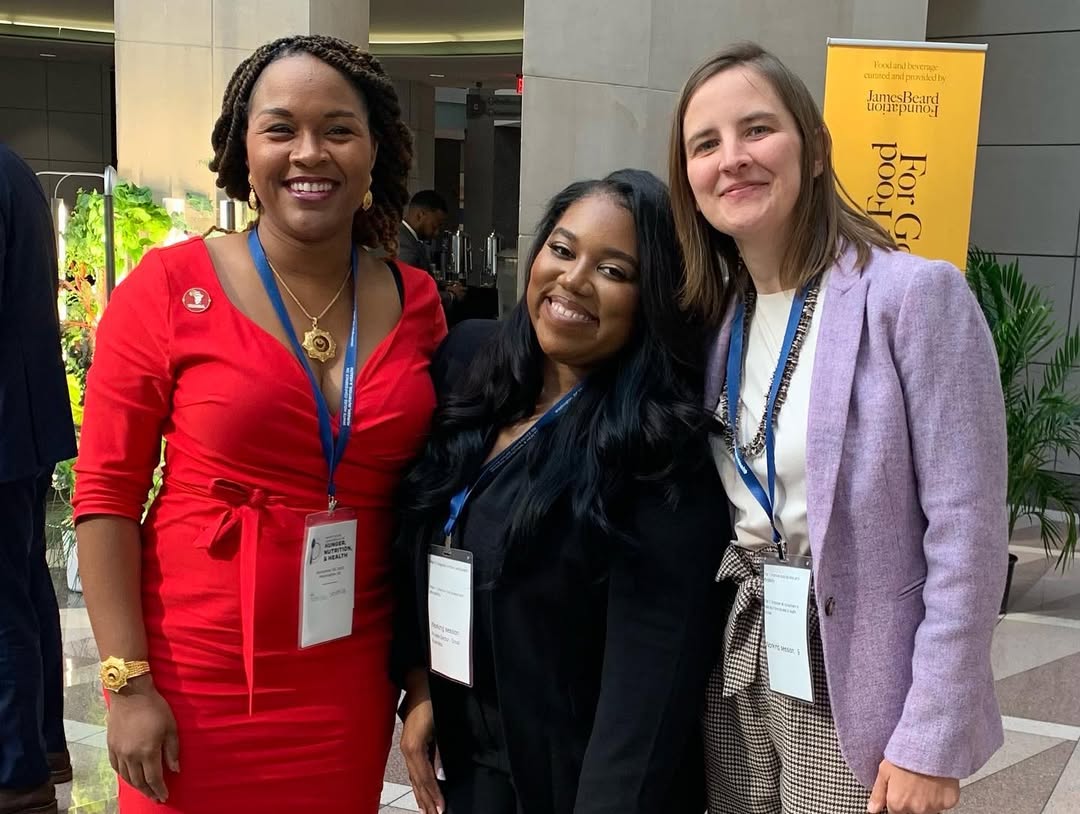People fighting for a fairer food system are worried and exhausted, but remain undeterred.

People fighting for a fairer food system are worried and exhausted, but remain undeterred.
February 10, 2025

Shorlette Ammons, left, at a USDA Equity Commission meeting. (Photo credit: Christophe Paul/USDA)
Shorlette Ammons comes from a family of tenant farmers in eastern North Carolina. Her grandfather raised hogs and grew row crops. In high school, she worked summers in tobacco and cucumber fields. Working with farmers, she said, was her calling.
Expand your understanding of food systems as a Civil Eats member. Enjoy unlimited access to our groundbreaking reporting, engage with experts, and connect with a community of changemakers.
Already a member?
Login
She did exactly that at North Carolina Agricultural and Technical State University, created by the state in 1890 to provide agricultural education to Black Americans while maintaining segregation. And she worked on equity in food systems at North Carolina State University, the state’s primary educational institution for farmers, which didn’t allow Black students to enroll until the 1950s.
In both positions, she connected Black farmers to technical and financial resources and helped to eliminate the barriers that they continued to face in getting access to programs and funding.
So she was honored, she said, when the U.S. Department of Agriculture (USDA) tapped her to serve on the its Equity Commission. The commission was created in 2021 through the American Rescue Plan to address the agency’s history of discrimination, after former President Joe Biden issued an executive order to prioritize equity across all government agencies.
“People of color, farmers of color—we’re still here. This effort to erase us hasn’t worked in the past, and it won’t work this time around . . . . The work doesn’t stop just because the report’s crumpled up and thrown in the trash can.”
“I didn’t go in there with the mindset that we were going to flip the USDA upside down,” said Ammons, now the co-executive director of Farm Aid, a nonprofit organization and festival that supports small family farms. “But we knew that we could make some strides and kind of create a path so that some of those past and historic wrongs were on the way to being made right.”
Past lawsuits and reporting have found that, for decades, the USDA purposefully and systematically denied farmers loans and other support based on race, contributing to a massive decline in the number of Black farmers in the U.S.
In February 2024, after three years of research, public meetings, and subcommittee meetings, the commission—which included civil rights advocates, diverse farm group representatives, and rural development experts—presented its final report to former Secretary of Agriculture Tom Vilsack. It included 66 detailed recommendations laid out over 87 pages, the first of which was simple: “Institutionalize equity within the Department.”
Instead, within President Donald Trump’s first two weeks in office, USDA officials scrubbed the report and information on the Commission’s work from the agency’s website.
It’s one of several initiatives at the USDA that has already hit the cutting-room floor as a result of Trump’s executive order titled “Ending Illegal Discrimination and Restoring Merit-Based Opportunity.”
At the end of January, the Office of Management and Budget sent a memo directing the USDA to analyze its programs for anything that involves diversity, inclusion, accessibility, environmental justice, or equity. Career employees who previously worked on equity programs have already been put on leave. Employees within the agency say the sweep continues, with no clear sense of which programs might be next on the chopping block.
In addition to ending initiatives Trump considers related to diversity, equity, and inclusion (DEI) within all federal agencies—including those that touch the food system, like the U.S. Food and Drug Administration—the order extends beyond the agencies themselves, requiring recipients of federal grants to certify they don’t operate “any programs promoting DEI.” The order also encourages the private sector to end DEI programs.
That puts into question the future of the USDA’s many grant programs that focus on supporting and feeding underserved farmers and communities. (Most of those programs are authorized and funded by Congress, but Trump has already defied laws meant to maintain checks and balances on other fronts. His abrupt firing of the independent inspector generals is one example.)
On January 31, Elon Musk’s Department of Government Efficiency (DOGE) posted a list on X showing more than $110 million in “contract cancellations” related to DEI at the USDA. But it’s unclear what the list refers to, and the USDA did not respond to detailed questions about the number or other points in this story by press time.
What constitutes “DEI” is also still unclear. In the original order, Trump argues he is putting an end to “dangerous, demeaning, and immoral race- and sex-based preferences under the guise of so-called ‘diversity, equity, and inclusion’ (DEI) that can violate the civil rights laws of this Nation.” As laid out in the order, that might apply to a wide range of varied efforts, from “equitable decision-making” requirements to “promoting diversity” to “advancing equity.”
But advocates like Ammons and other individuals and groups across the country who have been working for decades on racial justice in the food system say it’s just another example of the age-old effort to erase the country’s still-recent record of slavery and race-based discrimination and stall progress toward a fairer future.
In conversations with Civil Eats over the past few weeks, advocates, organizers, and nonprofit directors were exhausted. They worried about funding for organizations that serve farmers and rural communities. They were concerned about funding for organizations that provide food aid to communities of color—cuts that might happen in conjunction with Republicans’ promised cuts to the country’s safety net. They feared the ripple effects of the federal order spreading and hurting groups working on food justice in local communities from coast to coast.
But they were also undeterred.
“People of color, farmers of color—we’re still here. This effort to erase us hasn’t worked in the past, and it won’t work this time around,” Ammons said. “Part of the reason those folks were brought together for the Equity Commission is because it’s work they’d already been doing. The work doesn’t stop just because the report’s crumpled up and thrown in the trash can.”
Similarly, in an email to the group Black Professionals in Food and Agriculture shared with Civil Eats, President Kent Roberson acknowledged that members might already feel worn out by the attacks on equity work. “I believe the present age is what our organization was founded for,” he said, “not for the times when we have Black leadership across government, in our corporate organizations or associations, but for the times when we are under attack and fighting for the rights and respect of Black people in food and agriculture.”
As the Biden administration prioritized equity across federal agencies over the last four years, the MAGA movement within the Republican party, led by Trump, began demonizing DEI and attacking various efforts to acknowledge and repair past discrimination within the food system.
In 2021, after Democrats in Congress included a pot of money in the American Rescue Plan to compensate Black farmers for historic discrimination, for example, conservative groups filed multiple lawsuits to block the program, claiming discrimination against white farmers. The largest suit was filed by Sid Miller, the Texas secretary of agriculture and a close Trump ally. Rather than fight the suits, lawmakers later rescinded the program and wrote a new one into law that was race neutral, allocating money based on discrimination of any kind.
“The purpose of DEI initiatives is to broaden the pool of qualified candidates, knowing that historically some of the most qualified were overlooked and dismissed.”
A zeitgeist took hold in which political points could be scored by opposing any effort on behalf of marginalized communities. In the fall of 2024, the Atlanta-based Fearless Fund was forced to shut down a venture capital fund for Black women entrepreneurs after conservative activists sued the group for racial discrimination. Several food companies were among those supported by the fund, including Fresh Bellies, Air Protein, and Partake Foods.
In Aurora, Colorado, a small nonprofit called Food Justice NW Aurora spent two years proposing and fundraising for a project that would have renovated three city-owned greenhouses that had been empty since 2010 and were in danger of collapsing from disrepair. The group proposed restoring them and turning them into spaces for food production, job training, and educational programming in a low-income neighborhood where fresh food is hard to find.
The group was selected as a top contractor for the project and raised the funds to make it happen. But at their final meeting with the Aurora City Council last summer, during which they expected the council to sign off on the project, they were shocked when council members denied them the contract, Food Justice Executive Director Caitlin Matthews told Civil Eats in an interview.
According to Matthews, members of the council then shared the reason: Conservative council members spotted a statement on the group’s website that acknowledged the American food system had been built on Indigenous land theft and the enslavement of Africans.
“All work to imbue racial justice in food work is under threat,” said Shakirah Simley, the executive director of Booker T. Washington Community Service Center in San Francisco, told Civil Eats in between emergency meetings to discuss whether her organization might be impacted by pauses or cuts to federal funding.

Volunteers at the Booker T. Washington Community Service Center in San Francisco. (Photo courtesy of the Booker T. Washington Community Service Center)
“What we’re seeing is a lot of chaos, a lot of confusion, a lot of disruption, which I think is meant to distract us from something more nefarious,” said Simley, who is also on the Civil Eats advisory board. “But these decisions make direct, immediate harm to our most vulnerable communities.”
The Booker T. Washington Center was created more than 100 years ago to serve Black soldiers returning from service in the first World War and their families. Today, it provides affordable housing, food sovereignty, and nutrition programs, including feeding about 1,500 residents each week.
Simley said she was especially worried about funding to food justice organizations being stalled at a time when Republicans in Congress are also discussing cuts to federal hunger programs like the Supplemental Nutrition Assistance Program (SNAP) and Medicaid.
“If things dry up or disappear or are held up, then that trickles down to a local level,” she said. “It’s just cruel and inhumane.” For example, she said that when one pandemic-era assistance program was ended last year, the Center saw around a 30 percent increase in enrollment in its programs that provide food assistance.
The pandemic, she said, also provides a model for responding to disruption. “It feels a little bit like déjà vu. From an organizing and justice perspective, there’s a lot of good conversation around saving ourselves, focusing on mutual aid, focusing on community care. I think a lot of this stuff is going to have to stay local,” she said. “We can’t respond to every fire. We have to triage and think about where our energies are most directed. We have to be adaptive and nimble, and we have to look out for each other.”
Many advocates also said they will continue their work to uproot racism in federal food and agricultural policy, even if their tactics might change, and that collaboration is already in the air.
Ammons spoke to Civil Eats from a farm conference in D.C., where she said many conversations focused on the fact that “we’ve been here before” even as the groups present fretted over funding cuts. “We’re not just thinking about ourselves, we’re thinking about all these organizations that have received funding to do a range of work that are on the chopping block now,” she said. “We’re here to support them as best we can.”
As Agriculture Secretary nominee Brooke Rollins sailed toward confirmation in the Senate last week, Nichelle Harriott, policy director at the HEAL Food Alliance, a coalition of more than 50 farm, food, and environmental organizations, sent out a statement.
“If things dry up or disappear or are held up, then that trickles down to a local level. It’s just cruel and inhumane.”
“Her history demonstrates a disregard for and lack of commitment to supporting Black, Indigenous, and other farmers and ranchers of color, as well as small and family farmers, farmworkers, and the working people who sustain our food system,” Harriott said. “Despite this, we call on this new Secretary to prioritize disaster relief for farmers facing climate-related disruptions, invest in small farms and those practicing traditional, cultural, and ecological farming methods, ensure protections for food and farmworkers, and safeguard vital nutrition programs like SNAP to reduce hunger nationwide.”
On February 3, a coalition of groups that includes the restaurant worker union ROC United sued to stop the executive order on DEI from being implemented.
At the National Young Farmers Coalition (NYFC), the policy team is busy working on developing proposals for an upcoming farm bill or other legislation that they believe could help solve land access challenges for young farmers from diverse backgrounds, a priority that they feel holds sway on both sides of the aisle because of growing concern over the aging of American farmers—regardless of anti-DEI rhetoric.
Michelle Hughes, a former hog farmer and now the co-executive director of the NYFC, also served on the USDA Equity Commission. She said throwing out the Commission’s report and the dismantling of equity throughout USDA is “the reason to invest in advocacy and federal policy change work. It’s a setback, for sure, but do I think that it’s going to stall the movement? No. If anything, it should ignite people to do the work themselves.”
Ammons was also adamant that Trump’s executive order misconstrued racial justice efforts as programs that reward and promote less-qualified individuals. (Others have called out the fact that while Trump says his intention is to create a merit-based system, several of his cabinet nominees lack experience in the subject areas covered by the agencies they’re now leading, including Rollins at the USDA.)
In the order, Trump said that DEI initiatives shut hardworking Americans “out of opportunities because of their race or sex” and that they threaten American safety by “diminishing the importance of individual merit, aptitude, hard work, and determination when selecting people for jobs and services in key sectors of American society.”
Ammons said that she believes efforts to acknowledge race-based discrimination and make hiring and programming more equitable do the opposite of what Trump claims.
“Many of the people on the Equity Commission come from a lineage of people who literally help build this country. We come from people who are some of the hardest-working people—who grow our food, get it safely and efficiently on our plates, in our stores, into our homes,” she said. “The purpose of DEI initiatives is to broaden the pool of qualified candidates, knowing that historically some of the most qualified were overlooked and dismissed.”
She added that when diversity is prioritized in food and agriculture in a thoughtful, intentional way, it benefits all farmers and rural communities.
In the end, the NYFC’s Hughes said that while she still believes the Equity Commission and its report was something to be celebrated, there was always going to be more work to do. “I don’t see the federal government as the be-all, end-all for equity work. I don’t even think they’re a major player. I think they’re a major player in inequity,” she said. “I’m not scared, and I don’t really feel like there’s anything that could happen that would make me back down from advocating against injustice. I see it as a long-term movement and effort that I have completely committed myself to.”

July 30, 2025
From Oklahoma to D.C., a food activist works to ensure that communities can protect their food systems and their future.
Like the story?
Join the conversation.